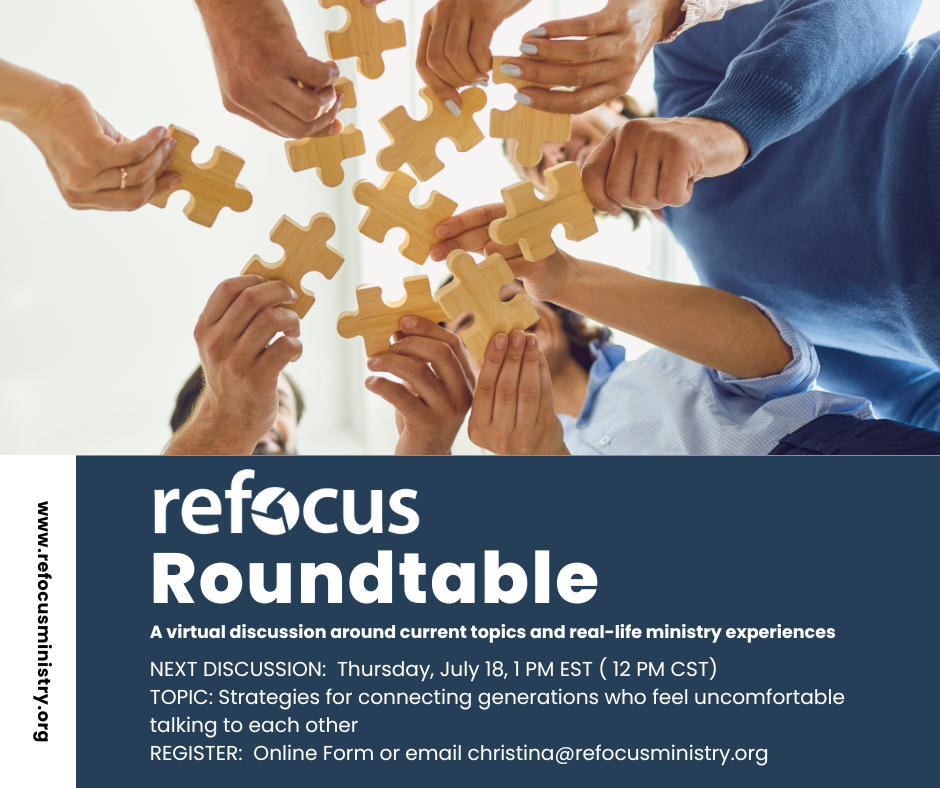“Intergenerational”
This word was not a familiar one just a decade ago. When I started talking about intergenerational ministry, the difference between family ministry and intergenerational ministry, the nuances between multigenerational and intergenerational, and terms like “age segregation” and “generational discipleship” in 2014, I got my fair share of odd looks and a wondering stares. To be sure, there were always a group of people talking about all things intergen, but for the most part, family ministry and children’s/youth ministry and even NextGen ministry were the terms that most people were familiar with.
Over the last decade, due in large part to continuing research that shows the immense benefits of a generationally-connected community, the term “intergenerational” has been used more and more. In 2020 in particular, ReFocus experienced a huge upswing in churches looking for resources and strategies for including all-ages in worship and learning experiences and for connecting generations in meaningful relationships.
But, despite our recent embrace of this approach and the growing conversation around the importance of generational discipleship in our churches, the truth is… this is not a new conversation. In fact, this tendency to remove children and youth from our larger gathering, whether intentionally or unintentionally, has been an ongoing conversation, truly since the beginning of age-specific Sunday School practices.

I recently had the opportunity to read a series of lectures from Yale Divinity School in 1888 given by Henry Clay Trumbull on the topic of “The Sunday-school: Its Origin, Mission, Methods, and Auxiliaries.” To be clear, Trumbull is a Capital-F Fan of Sunday School as he has experienced it. Keep in mind that during Trumbull’s time, Sunday School was held at a different time than the larger church gathering, so it was very much a “both/and” experience for him.
But Trumbull had some pretty serious words in reference to the congregational gathering, especially the preacher and the sermon that was delivered during that time. I wish I could just share the entire lecture with you here, but to give an example of his thoughts, here are a few lines from his lecture (emphasis added):
“Children are indeed expected to attend the church services where preaching is a prominent feature, and where it is even counted a means of grace; but the pulpit preacher does not, ordinarily, recognize, as a corollary of this expectation, his corresponding duty to adapt his preaching to the capacities and needs of his children hearers… the modern church practically deprives those children who do thus attend, of the chief advantage of that agency, by couching the addresses of the pulpit in language which is to the children an unknown tongue.”
“Whether looked upon as out of Christ or as in Christ, a child has a stronger claim than an adult on the preaching service of a minister of Christ, when the two are brought into practical comparison. If more ministers would preach to the children of their congregation, more of the grown people would understand their ministers.“
(The following is an example of how Trumbull feels a pastor can adapt his sermon to include all ages)
A pastor is preaching to his adult congregation in his ordinary style. At a fitting and a well-considered point in his discourse he pauses, looks down into the faces of those children who are be fore him, and says familiarly: ” I want these children who are here this morning to understand what I am preaching about.” By that time the preacher has the ears of every child in the congregation; and he has caught the fresh attention of not a few of the adults whose thoughts were wandering. He repeats his text, and tells its meaning in a few simple words. He gives a carefully chosen illustration, calculated to make the main truth of his text clearer to a child’s mind. He adds an application of the text and its truth to the daily life and to the life purpose of a child. Then he says : ” Now, children, that is what I am preaching about ; and I want to see if you can understand what I am saying about it to these older persons;” and he resumes the thread of his discourse, after a digression, or after a re-impression, of this sort, of perhaps three or four minutes. Every child in that congregation feels that that sermon is preached to him. He listens to his preacher with a new interest in what is being said, even though he can not understand it fully. And more than a majority of the older members of that congregation — wherever the church may be — are enabled to have a better understanding of the point and purport of that sermon than they could have gained without some such mode as this of its illustration and enforcement.”
Trumbull recognizes a few things:
- Children are children, period! Yes, we should include them in our times of communal worship and learning but we shouldn’t just expect them to act like adults. Instead, we should embrace their childlikeness as the gift it is, as Christ said, learn from them and with them.
- Adults can gain from the presence of children. As much as we might like to pretend that all adults are engaged and attentive during the sermon, the truth is that all of us experience wandering minds and inattention. As Trumbull points out, gaining and maintaining the attention of children actually re-engages all in attendance and ensures that what is being shared can be understood easily by all.
- When we welcome a child, we welcome Christ. Jesus tells us this in no uncertain terms and Trumbull understands that this means a child, as he put it, “has a stronger claim than an adult on the preaching service of a minister of Christ.” Having children welcomed in our midst assures the welcomed presence of our Savior as well (Mark 9:37).
Trumbull demonstrates that if a Sunday morning communal worship experience is inaccessible to children, then Sunday School becomes the only viable alternative for them learning about Christ. But he states, unequivocally, that ”obviously, a better way still, is for children to have the incalculable advantage of pulpit ministrations suited to their capacities and needs in addition to all that could be secured to them by the best Sunday-school teaching ever.”
While Trumbull and I don’t see eye-to-eye on everything in his lectures (to be fair, I have the benefit of hindsight and a LOT of research), he is touching on something very important:
If we are to have space in our communal gatherings to welcome children, we must be willing to welcome them as children, to lay down our claims to a worship service targeted and directed towards our adult desires, and willing to selflessly and graciously welcome the children as we welcome Christ.
Trumbull concludes his lecture with a story from a Massachusetts pastor and an interaction he had with his young daughter. I hope it makes you smile as it does me, and I hope our conversation of connecting children and adults in times of worship and learning.
“Papa, are you going to say anything to-day that I can understand? ‘ asked a little girl of her father— a Massachusetts pastor — as he was setting out for church on a Sabbath morning. This tender appeal touched the loving father’s heart, and he could not answer his daughter nay; he could not say to his child that she must sit in penance through all the long service with never a word designed for her instruction and cheer. So, as he preached, he said, ‘And now, children, I will say something to you about this.” At once the face of every child in that audience brightened. Sleepy little ones started up; tired ones took fresh heart. Looking first at the minister, then at each other, again back to him, they were all eagerness for his message, as though now there was something else for them than to nod and yawn and ache uncared for ; and although the pastor’s following sentences to them were few and simple, doubtless many felt as did the child who had pleaded for this attention when, on her return at noon, she said contentedly, ‘ Papa, I under stood all that you said this morning.’ Dear children! Who wouldn’t do as much as this for them in every sermon? — they are gratified so easily.”
ReFocus Roundtable: Connecting Generations in Discussion Together
July 18, 2024 from 1 pm to 2pm, EST (12 pm CST)
The benefits of intergenerational relationships on both young and old have been enumerated by researchers and ministers alike but in many circles, there is resistance especially from adults. Many adults express that they feel uncomfortable engaging with younger generations. Offering the reticent a few tools for positive interactions can lead to opportunities that lead to meaningful relationships and lifelong discipleship.
We invite you to join us for this interactive conversation as our shared voices will help us all to connect generations in meaningful relationships for lifelong discipleship.
It’s Time To Connect

ON SALE NOW! $99 Total (regularly $149)!
Connect Generations Coaching is a one-time intensive coaching experience that uses a research-based ministry assessment tool designed for churches to complete in less than a week.
This unique coaching experience offers specific insight into the barriers and bridges to connect generations and bring your community together. The Connect Generations Ministry Assessment Tool & Coaching Experience are available now for only $99.
About the Founder of ReFocus Ministry
Christina Embree is the founder and director of ReFocus Ministry. She holds a masters in ministry focused on Children, Youth, and Family Ministry and a doctorate in spiritual formation with a focus on age segregation and intergenerational ministry.
In addition to coaching churches of multiple denominations and traditions all around the globe, Christina serves as the Minister of Generational Discipleship for the Great Lakes Conference of the Brethren in Christ and as Next Gen pastor at Open Door Church in Lexington, Kentucky.
She is widely recognized as a speaker and author in the areas of generational discipleship, intergenerational ministry, and family ministry. As the mother of three children, she is familiar with the challenges of faith at home and pastoral ministry. She along with her husband Luke share a love for the church, their community, and the global work of peace and restoration through Jesus.
Interested in having Christina visit your church, speak at your conference, or coach your team?
Christina speaks on a wide range of topics related to children, youth, and family ministry with a unique focus on connecting generations for discipleship within your church. Her personalized approach allows you to pinpoint the needs of your community and gain the insight that you are looking for. Whether this is a volunteer team training and pastoral staff meeting or a ministerial conference, her experience and knowledge will help you determine the next step forward in creating lifelong disciples.




1 Comment
Hetty Stok
If only we could get this wisdom in elixir form on a teaspoon, and feed it to some pastors.